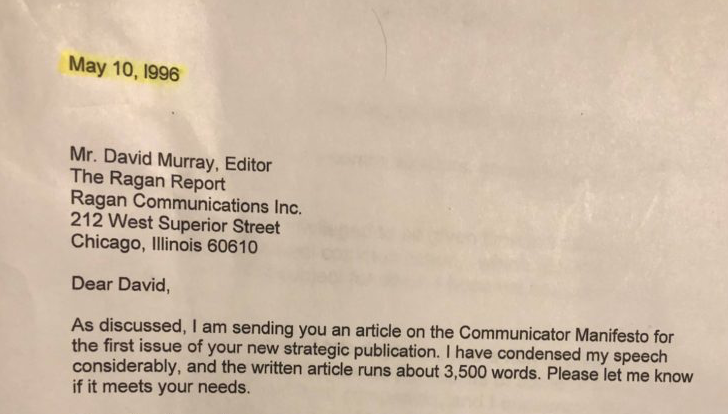The sound of my own counsel
April 14, 2021
To oppose or not to oppose the new voting rights laws. A CEO asked the comms chief, and the comms chief asked me.
A CEO asked his exec comms director, among others: Should I proactively make a statement against recent and looming changes to voting regulations? And the comms chief asked me for my perspective. I won’t bore you with the paragraphs about how I have come to the conclusion that “the people who are pushing hard to restrict voting, it seems to me, are either misguided, or motivated to suppress voting for their party’s political gain. And I believe the former are misguided by the latter.” You don’t want to hear a poor old writer’s thoughts on voting rights policy, whether you’re inclined to agree with them or not. In fact, there’s only a slight chance that you want to read the rest of this. But in the spirit of last week’s locker-room pep talk urging communicators to offer their heartfelt counsel, here’s mine, edited to conceal the recipient, and for clarity, and on account of I thought of a few better phrases here and there in the meantime. —DM
***
An executive communicator told me the other day: “When I worked for Nabisco in the old days, no one cared what the CEO thought about Black Lives Matter. They just wanted good cookies—and that’s what we gave them! Alas, today, people want their cookies with a glass of virtue and some hand wringing on the side.”
That’s a cynical way to look at it, and I think it’s the way you and I both look at it sometimes, too. Another communicator today said she worried that CEOs weren’t saying what CEOs thought, because CEOs don’t really have opinions on these things—or if they do, their opinions are not in the realm of the politically acceptable. She worried that CEOs were by default mouthing what their communicators thought! Which reminded me of your comments the other day, about all of this corporate social justice communication being pretty formulaic, and somewhat pointless.
But honestly, I don’t think it is. I think CEOs are on their heels a little bit, or a lot. Yours is polling people for their opinions, where he surely wouldn’t have 10 years ago. Isn’t it good, in a society, to have leaders asking other people, “What do you think?” Which means leaders are questioning their conscience, or their omniscience—or at the very least, the extent of their power.
And if communicators and others are telling them they ought to err on the side of the mostly powerless people whose votes we are talking about here—and if they are following that advice in public—what does it matter whether they truly believe it or not, themselves?
Something’s happening here.
And after 30 years of reading and quoting and publishing CEOs’ speeches, unmemorable because they weren’t saying much of real public consequence—the thing that’s happening feels essentially good.
Sustainable? I’m not sure. Truly consequential in the long run? I can’t tell you. A spasm that we will one day look back on with a wry smile? Perhaps.
But people are turning to your CEO and other corporate leaders for a reason—a dearth of political or government leadership or even journalistic integrity that anybody trusts in common, and even a paucity of spiritual leadership (have you seen how church membership has fallen in the last 20 years?).
And I think [your CEO] is better off embracing that he is NOT leading just a business, not leading just an industry—but that he appears to be leading one of the only institutions stable enough, trustworthy enough and excellent enough that people actually care what the leader thinks.
Corporations playing a parental role in American society is not brand new, either. My grandfather Charles Murray was head of public relations and personnel at Armco Steel, in Middletown, Ohio.

This was a company town where, for most of the 20th century, if the community needed anything—a library, a swimming pool—it went to Armco for the money, and for organizational support. My dad remembered many a night when my grandfather would have just sat down to dinner after another long day at the General Offices, when a knock would come on the side door. My grandmother would harrumph in exasperation, for she knew it would be some steel worker in need of some favor, and she knew the conversation would not be quick.
One that my dad remembered was a Black man who had brought over his wife’s homemade fried chicken to share with my grandfather, while he told him at length that the wife had cancer and they needed money for an operation.
My rich white grandfather ate the Black man’s chicken, and the man got the money. That was about 1930.
Is that the kind relationship we want to perpetuate between corporations and the powerless?
We still have great social injustice in this country, and I’m sure [your CEO] knows that. He’s one of the most powerful people in his whole state, which is why he’s agonizing over this.
Unless he has a strong opinion, better grounded in genuine study than mine, in favor of these voting laws that are coming down from everywhere as an overwhelming solution to a voter fraud problem that doesn’t seem to demonstrably exist—then I think he ought to add his voice to those opposing these laws.
He can distinguish himself, too. He should work with you to articulate his rationale for doing so, perhaps even acknowledge his reluctance to come across as another “woke CEO,” and explain his long and unpredictable journey as a leader who began his work at a truly different time. And the sense that he must have, if he still feels energized for the work, of a long and unknowable journey yet to come.
***
That was my counsel. It was an honor to be asked, it was liberating to offer and I’m glad to have it down in words—even if those words merely provide a whetstone for a sharper or more fully developed alternative recommendation. Yours, perhaps.



